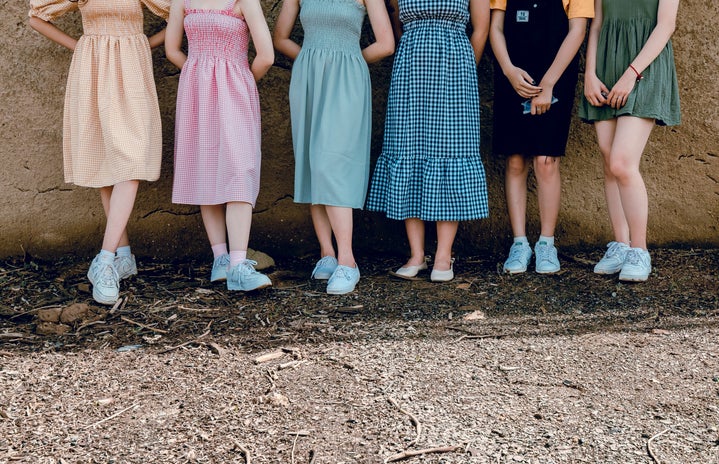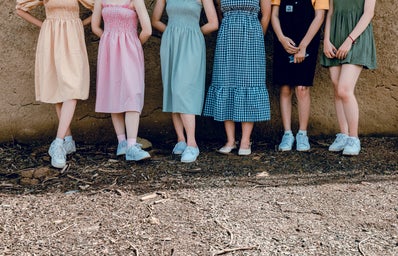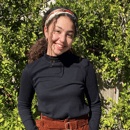As I’m sure you have all seen on the news lately, there has been a significant rise in hate crimes that target the AAPI community. Elders, women and children have been harmed in horrific, racially motivated attacks, losing their lives due to the rash and irrational actions of racist and hateful individuals. Now more than ever, it is incredibly important for everyone to listen to and uplift the voices of those in the AAPI community. That’s why I thought it would be cool to highlight the voices of some of my amazing AAPI friends who are so special to me and who inspire me every single day! In their own words, here’s how their heritage and passions make them all unique. Check out their wonderful stories:
- Sophie Paven (21, Applied Mathematics Major)
-
“I was adopted from China by a Jewish family when I was 8 months old. Being the only Asian person in my family, I always knew that I was adopted and I never felt weird about it. I grew up in a small town in Boston with a population that’s just about 97% white. I was 1 of 2 Asian students at my school, and so I experienced microaggressions at a very young age; some of the kids at school would stick their pinkies out at me and make other demeaning jokes. I have always been someone who cares deeply about other people, but as I’ve grown up, I’ve learned that not everyone is going to be like that. I’m very aware that that in this country, many people aren’t welcoming towards people like me. My identity is very intersectional in nature: I’m a queer woman of color. I’ve come to realize that in this country, my being alone is political. Being Asian in America has made me political; it’s made me an activist, and made me care even more about other people. Race has always been a way in which I navigate life, which is why choosing a college with an accepting and diverse community was so important to me. When I got to UCLA, it was the first time that I felt like I truly belonged somewhere. Growing up in Boston, I often made Asian jokes about myself before others could, because I was viewed as Asian first, and a person second. At UCLA, I exist as just a person first, and I’m no longer being exoticized. That’s why it’s been pretty difficult to have been ripped away from that safe haven due to COVID. I haven’t been going out much at all this year due to the pandemic, but the anti-Asian hate crimes have given me another reason to question whether or not I should go outside. It’s been really strange to think about the possibility of being attacked. When I do go out, I wonder if people can tell that I’m Asian just by the parts of my face that aren’t concealed by my mask. There’s a harmful stereotype that Asian people aren’t cool, and as a musician, I have definitely internalized that. Sometimes I feel like my singing voice doesn’t sound the way people think it will, like people aren’t expecting my unique sound. The biggest lesson that I have learned throughout my experience is that I can’t help who I am, and I can’t choose how other people see me. But because of this, I might as well embrace my identity to fight for a better, more inclusive society.”
- Marianne Sarne (20, Legal Studies and Psychology Major
-
“It’s difficult to answer the question “What does being Filipino mean to me?” because there’s not just one concrete answer. I would say though that because I’m Filipino, family means absolutely everything to me. I keep all of my family and our traditions close to my heart, and being so far away them makes me realize that now more than ever. Growing up, I have always heard people saying that “Filipinos are so nice.” My family is exactly like that. They’re so kind that they will literally offer up their own homes if you need it. My family puts out so much love; since many of my relatives are immigrants, they know how hard things can get, so in their eyes, why wouldn’t you want to help someone out? That kindness has been engrained in me since I was young, and I take it with me everywhere I go. I am so fortunate to have elders on both sides of my family. I get to learn so much about my family history through them and I can’t tell you just how much I value them. At Berkeley, I’m involved in a club called the Partnership for Pre-Professional Pilipinxs (P4). As part of this club, I helped start a video series called the “Baon Series.” In Tagalog, baon translates to a sack lunch that you take with you to school. I used that as a metaphor for what you take with you on your journey of life. The series highlights our Filipino-American experiences and how we will take those with us into the world! Down the line, I want to become a lawyer. When you think about it, there aren’t that many Filipina women in law, and that’s part of what motivates me to get there. This might sound cliché, but making and taking space is truly so important. I know that being a lawyer would give me, a Filipina woman, a strong voice, and I will take the values that I’ve learned from my family throughout every step of the way.”
Check out the Baon series here! https://www.youtube.com/channel/UCnNx9j2aNeRk1-0tdrQEI9Q
- Sheena Lee (20, Hospitality Management Major)
-
“If you know me, then you know that I am very proud of my Korean heritage. As I’ve gotten older and learned more about Korean history, it’s allowed me to appreciate my culture even more. My biggest passion is my love for food-especially Korean food. Over the past year, I’ve been working osn a passion project that’s geared toward changing the public view of Korean dining. Most non-Korean people’s experience with eating Korean food is very casual, usally going to a K-BBQ place with your friends and just eating a lot of cooked meat. But what most people don’t know is that there is a wide diversity of seasonal Korean foods that are so unique. For example, in the fall, Korean cuisine incorporates a lot of chestnuts and persimmon into its dishes. I want people to experience these details of traditional Korean food in an exquisite, fine dining experience. My vision is for people to experience this fine dining with Korean dishes that come in courses, which would highlight the widespread diversity in my heritage’s food. In the future, I want to own my own restaurant, which is where I want to showcase all of these ideas that I have, but I’ve already started working towards achieving my goal!”
- Emily Fukuda (20, Communications Major, Music Industry Minor)
-
“My biggest passion is definitely music. I’ve been playing music and writing songs at a more professional level since I was in high school, and it’s just the perfect way for me to express myself and get lost in my own thoughts. Growing up, I didn’t see many Asian American artists in the mainstream; but I listened many Chinese and Japanese artists (like Hikaru Utada) with my mom, who immigrated to the U.S. from Japan when she was in 7th grade. Music allows me to uniquely express myself as an Asian American; playing instruments, writing songs and singing allows me to tap into my identity more. There’s not a lot of us who end up breaking into the entertainment industry, and when we do, we’re usually cast in the typical “model minority” group. There are only a few all-Asian groups out there that are promoting increased advocacy for a greater Asian presence in the music industry, like Run River North. When you finally do see groups and artists like this, like Hayley Kiyoko for example, it’s incredibly inspiring. I’m currently the president of Deviant Voices A Capella (DVAC). Two of my very good friends Sophie Paven and Aija Le, both Asian American women, are the music directors of the group. It’s really empowering to have a strong, Asian American female presence at the head of the group, and again, it’s something that’s not as common as you would think. We are viewed as the model minority, but we aren’t given many leadership positions where we can thrive. That’s also a big reason why I want to go into entertainment law in the future. I want to work to protect marginalized artists of all backgrounds and work to promote their stories and voices. I want to hear more AAPI stories and hear their music in the mainstream media.”
- Sarah Finch (19, Psychology and Political Science Major)
-
“I was born in China and adopted at 10 months old by a Japanese family. I grew up in Northern California, and as a result had a very American upbringing. I never thought that being adopted was a big thing, I just knew that it’s who I am. Once I got to UCLA, I joined the Nikkei Student Union (NSU), which has taught me so much about my Japanese identity. I’m learning a lot about the Japanese internment camps and how this influenced an entire generation of Japanese Americans. We even do a trip to Manzanar, which I am really looking forward to visiting someday. I’m so grateful for this opportunity to reconnect and keep learning. To keep in touch with my identity as an adopted child, I joined China Care Bruins, an organization that works with adopted children, most of them from China. I’ve met so many adopted children, most of them not really even aware of their situation. As part of this club I’ve also been able to speak at an Adoption Panel, where I was able to share my story with these kids and my fellow club members. I’m also currently working at a research lab that focuses on adopted and foster youth in LA county. We help provide these children with accessible therapy options, and do research to see how these methods are working. It’s really amazing to be working for a cause that I’m so closely connected to but is also so much bigger than myself. I know that our work will be beneficial for so many kids, and that’s truly the best part of it. In the future, I want to go into social work law, more specifically, adoption-field law, so I continue this work on an even larger scale!”
- Chesca Legaspi (19, Computational Systems Biology Major)
-
“I am extremely passionate about pursuing a career in the technology industry. There are so many stigmas and misconceptions that surround careers in the industry, though. Everyone thinks that you have to just be naturally gifted at coding and computer science to make it big, but that’s honestly not true at all. My passion for creativity and technology has led me to join Bruin Women in Business (BWIB), and through this organization I have been able to reach out to professionals in business and technology industries and learn from their unique experiences. I’ve been pleasantly surprised with how open and willing these professionals are to offer their insight and advice to college students they’ve never met before. As a woman of color entering a male-dominated industry, I’ve been the most interested in speaking with successful female product managers and listening to their experiences navigating the industry. This has all lead me to my newest passion project: a new tech podcast! In this podcast, my aim is to debunk common tech-industry myths and beliefs while promoting inclusion and diversity in the industry. Since I’ve learned how to network with professionals through my involvement in BWIB, I thought it would be cool to invite PM’s from big corporations like Google to come and share their thoughts as well. I basically want people to know that though the industry can be intimidating, anyone can launch a career in tech! Everyone’s ideas can be turned into reality, which is really my favorite part about this industry. There are so many unique and interesting positions that no one really knows about, and I hope to educate people through this podcast. Finally, I want this podcast to serve as a platform for female empowerment and to highlight their stories and experiences. I can’t wait to get started!”
Honor and uplift your AAPI friends not just now, but always. But also keep in mind that we must listen to and respect all AAPI folks, not just our friends! We all must do our part to promote equity and inclusion.


